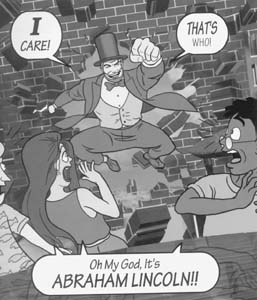
Superprez: Fresh from kicking Stephen Douglas' debating ass, the big Abe busts through a wall of apathy to teach a lesson in parallel history at a local school.
The man from Illinois splits heads as well as rails in a new comic book
'I'M BACK! and this time I'm playing for keeps!" shouts Abraham Lincoln as he bursts through a brick wall, like the superhero he is. He's come to school to prove a point to a few kids who say they don't care about American history. To inspire the students, Abe gives them a completely spurious lesson in the history of our nation, from the present back to the time of the dinosaurs. ("Don't be afraid--those are American dinosaurs!")
One well-read youngster, Byron Johnson, is suspicious, but the authorities don't believe him. The U.S. welcomes Abe back, handing over the presidency to him. Naturally, this Lincoln turns out to be a fraud, a closer for one-eyed octopi from outer space. Fortunately, the real Lincoln materializes to clean house and unmask the impostor.
Cartoonist Scott McCloud mulled over the use of symbols thoroughly in his indispensable book Understanding Cartoons, so it's only right that he turns loose patriotic symbols to run amok in his delightful graphic novel The New Adventures of Abraham Lincoln (Image/Homage comics; $19.95).
The sweet but pungent quality of McCloud's work is evident on every page. The man has studied comics so deeply that he can tell an involved story with grace and speed. What begins as a protest against the whitewashing of American history ends smoothly as a gag-filled parody of Hardy Boys/Scooby-Doo fantasies of smart-kid detectives vs. shifty adult criminals.
When the impostor Lincoln is publicly exposed, he snarls the line required on these occasions: "And it would have worked, too, if it hadn't been for that cursed brat." (Some prefer "those meddling kids"--but that's quibbling.)
It's a sarcastic story mellowed by McCloud's tangible sorrow at seeing Lincoln, the flag and all of the other symbols that represent America used to further repression and ignorance. McCloud doesn't drool Capra-style over the risen Abe. His Lincoln is physically flawed and charged with the executions carried out during the presidency (267 of them, though McCloud doesn't mention the number).
McCloud's real hero is young Byron--a nice touch, since Lord Byron was supposed to be a favorite poet of Lincoln's--a kid smart enough to question the rail splitter about the dictatorial powers the president assumed.
The youth also asks how Lincoln felt about black people. The answer to this particular question is in history. Lincoln said more than once that he thought that whites and blacks could never be equal. But why would Byron (who is African American) take Lincoln's evasiveness as serenely as he does in the book? Wouldn't such a bright kid be smart enough not to care what Abe or any other white man thought about black people?
PROBABLY ONLY die-hard black nationalists feel that Lincoln's racism keeps him from being a hero, and ultimately, Lincoln fought slavery at the cost of his life.
To study Lincoln requires slogging through layers of myth, a lot of which Ol' Abe laid down himself. But a battle with myth is a battle most politically minded people work through every day. George Orwell put it best: "To see what is in front of one's nose needs a constant struggle."
In having Byron make his peace with Lincoln, I think McCloud was trying to reconcile the warmth that he and all Americans feel toward Lincoln with the knowledge that there was a real and foible-ridden man under the image. While that sad-faced, thin, bearded martyr suggests Jesus ... well, he wasn't Jesus. As Edmund Wilson wrote, "Can an American be sure he would have voted for Lincoln?"
The New Adventures of Abraham Lincoln is a little frustrating--it provokes a deep idea and then skims over it. Still, what is here is choice: the Lenny Bruce-like scene of the False Lincoln meeting the all-too-real Newt Gingrich; the ceremony of handing over the government to the impostor complete with plenty of press chorusing and dumb questions; the true Lincoln's lack of sound-byte sense dooming him in a TV debate with the False Lincoln.
Finally, McCloud places the skinny, bony, helpless Lincoln against a Lincoln Memorial that represents all the artistic harm that tons of money and the bad taste of sculptor Daniel Chester French could wreak (a populist enthroned--such a hideous mixed metaphor). Anyway, McCloud's gentle mockery honors both the spirit of Lincoln and the spirit of democracy, much more so than that kitsch marble monstrosity reproduced on the back side of every penny.
[ San Jose | Metroactive Central | Archives ]
![[Metroactive Books]](/books/gifs/books468.gif)